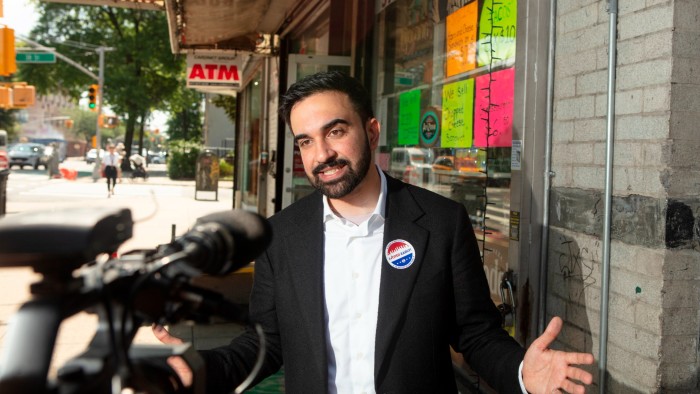Unlock the White House Watch newsletter for free
Your guide to what Trump’s second term means for Washington, business and the world
The race to decide the next Democratic candidate to be mayor of New York is going down to the wire and there are more than a few Wall Street titans sweating over the outcome.
Polling for the lead contenders — former mayor Andrew Cuomo and a 33-year-old assembly member Zohran Mamdani — has suggested the outcome will be close. For prominent Wall Street figures, the prospect of a socialist Mamdani taking the helm of the world’s largest financial capital has provoked an unusual degree of concern.
Assembly-member Mamdani has built his campaign around a promise to raise taxes on the city’s wealthiest residents and on the big banks and companies.
Bill Ackman, the founder of Pershing Square, Dan Loeb, the hedge fund founder of Third Point, Steven Roth, the founder of real estate investor Vornado, Anthony Scaramucci’s SkyBridge and former mayor Michael Bloomberg are just some of the biggest names across the financial industry collectively throwing millions of dollars to stop Mamdani.
Cuomo, the former governor who resigned in 2021 amid sexual-harassment allegations that he strongly denies, has re-emerged as Wall Street’s firewall candidate. “Fix the City,” the political action committee backing Cuomo, has already raised $24mn, making it the best-funded outside group in New York municipal history. Michael Bloomberg donated $8.3mn, while Ackman chipped in $500,000 and Loeb added $350,000.
Ackman, who used to be a prominent Democratic party donor and is now one of the most vocal supporters of US President Donald Trump, said that if Mamdani won there would be a “flight of businesses from New York”. “Most of the businesses that operate in New York City in the financial sector are incredibly portable,” Ackman, who lives on the Upper West Side, told the Free Press.
A prominent private equity investor told me: “Socialist policies have failed everywhere. Why would we adopt them in the world’s capital of capitalism? It makes no sense.”
Mamdani wants to impose a 2 per cent income tax on New Yorkers who earn more than $1mn year, introduce tighter rent controls, raise minimum wages, expand affordable housing supply and increase the city’s top corporate tax rate from 7.25 to 11.5 per cent — like in neighbouring state New Jersey — that he forecasts will generate $9bn in new revenue. Backed by US representative Alexandria Ocasio-Cortez and senator Bernie Sanders, Mamdani also wants to introduce government-run grocery stores as well as free childcare and buses.
It is an expansive agenda but the issue that appears to exercise Wall Streeters most is the tax increases. That touches on a broader national debate that is another hot button issue for the finance community — how to rein in rising national deficits, even if New York itself has a surplus. Finance leaders warn with mounting urgency that federal deficits are spiralling out of control.
JPMorgan’s Jamie Dimon has warned America’s borrowing binge will lead to a “crack” in the US bond market. His comments have been echoed by Jim Esposito, president of Citadel Securities, who warned that the growing US deficit poses a “ticking time bomb” risk to fiscal stability, and the president of Goldman Sachs John Waldron said that bond traders view the surge in US government debt as a bigger risk than tariffs.
But most in finance are opposed to increasing taxes or removing loopholes like carried interest, which is used by buyout investors to pay significantly less in taxes than income tax.
“High taxes are not the solution to crazy deficit levels . . . if taxes go up people will find a way to protect their earnings, it’s natural that people would do that,” said one hedge fund investor. “The problem is waste. We need to cut government expenditures and let businesses invest in innovation and growth.”
Making cuts without shredding programmes that voters cherish, however, is difficult. Even the cost-cutting drive by the so-called Department of Government Efficiency set up by Elon Musk only found a fraction of hoped for savings.
Next year will mark 15 years since the Occupy Wall Street Protests emerged after the financial crisis. The questions over inequality raised by that movement persist, not least because of the asset price bubble fuelled by an era of cheap money after the crisis. If tax is not the solution to deficits, Wall Streeters need to be clearer about what they recommend. Otherwise, support for the likes of Mamdani might only grow.
jfk@ft.com
https://www.ft.com/content/b3a10c9a-1a06-4123-ac5f-f31f0c0b745d


